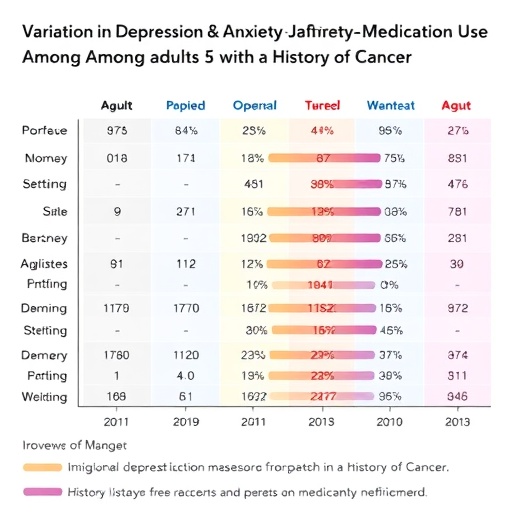A groundbreaking new study published in JAMA Network Open sheds critical light on the mental health challenges faced by cancer survivors, revealing significant disparities in the pharmacological treatment of psychiatric conditions among different racial groups. This extensive research highlights that individuals who have battled cancer are disproportionately more likely to be prescribed medications for depression and anxiety compared to those without a cancer history, underscoring the complex interplay between oncological outcomes and psychological well-being.
Cancer diagnosis and treatment are profoundly distressing, often leading to long-lasting emotional turmoil. The study meticulously analyzed data from a large, diverse cohort of patients to explore trends in the use of antidepressants and anxiolytics among survivors versus non-survivors. Results demonstrated a statistically significant increase in psychotropic medication usage among cancer survivors, reflecting the elevated burden of affective disorders such as depression and anxiety in this population. These findings emphasize the necessity of integrating mental health assessments into comprehensive cancer care protocols.
Delving deeper, the researchers unearthed alarming inequities related to ethnicity. Non-Hispanic Black cancer survivors were notably less likely to be prescribed medications for depression and anxiety compared to their counterparts from other racial groups. This disproportionate underuse signals potential systemic barriers, cultural factors, or gaps in access to mental health services that disproportionately affect minority populations. The study calls for urgent interventions targeting these disparities to ensure equitable mental health support for all cancer survivors.
.adsslot_yBD4oPzjq2{ width:728px !important; height:90px !important; }
@media (max-width:1199px) { .adsslot_yBD4oPzjq2{ width:468px !important; height:60px !important; } }
@media (max-width:767px) { .adsslot_yBD4oPzjq2{ width:320px !important; height:50px !important; } }
ADVERTISEMENT
The intricate relationship between cancer and psychiatric disorders is multifaceted, involving biological, psychological, and social determinants. Cancer-induced inflammation, neurochemical changes, and the psychological shock of diagnosis contribute to increased vulnerability to mood and anxiety disorders. Pharmacotherapy remains a cornerstone for managing these conditions, particularly when non-pharmacological interventions alone are insufficient. This study’s evidence strengthens the argument for vigilant mental health screening and timely pharmacological interventions as part of survivorship care.
Furthermore, the nuanced examination of medication patterns presents critical insights into healthcare utilization. While antidepressants and anxiolytics are pivotal in managing psychiatric comorbidities, their prescription is influenced by patients’ cultural perceptions, healthcare provider biases, and systemic healthcare inequities. The diminished treatment rates among non-Hispanic Black patients may reflect challenges such as stigma, mistrust of the medical system, socioeconomic barriers, or lack of culturally competent care, suggesting multifactorial roots behind these disparities.
The research methodology employed robust statistical analyses to adjust for potential confounders, including socioeconomic status, cancer type and stage, comorbidities, and healthcare access. By doing so, it firmly established that racial disparities in psychotropic medication use persist independently, reinforcing the complexity of addressing mental health equity in oncological settings. This methodological rigor contributes to the study’s credibility and underscores the urgency to dismantle structural obstacles in mental health care delivery.
Importantly, the study calls attention to the broader implications for clinical practice and policy. Integration of tailored mental health services within oncology clinics, enhanced provider education on cultural competency, and initiatives to improve healthcare accessibility are recommended strategies. Moreover, fostering patient-centered communication can bridge gaps in understanding and acceptance of psychiatric treatments, particularly in underserved communities, thereby optimizing survivorship outcomes and quality of life.
This investigation also poses crucial questions for future research. The biological mechanisms linking cancer survivorship with increased risk of depression and anxiety require further exploration, as do factors influencing the pharmacokinetics and pharmacodynamics of psychotropic drugs in cancer-affected physiology. Additionally, longitudinal studies assessing the long-term impacts of psychiatric medication adherence on survivorship trajectories could illuminate strategies to mitigate mental health decline post-cancer treatment.
As the medical community increasingly recognizes the importance of holistic care, this study exemplifies the imperative of addressing mental health as an inseparable component of cancer care. It advocates not only for the identification and management of psychiatric disorders but also for dismantling healthcare disparities that hinder optimal treatment among minority survivors. By focusing on equitable medication use, the study champions a more just and effective survivorship care model.
In disseminating these findings, the authors stress the collaborative role of multidisciplinary teams, including oncologists, psychiatrists, social workers, and patient advocates, in crafting individualized treatment plans. Such collaboration is essential to ensure that mental health needs are neither overlooked nor marginalized, particularly as survival rates improve and the population of cancer survivors expands globally.
The study’s dissemination through the open-access platform JAMA Network Open facilitates wide accessibility, encouraging dialogue and action among clinicians, researchers, and policy makers worldwide. The transparent sharing of these results not only advances scientific understanding but also galvanizes efforts to refine mental health interventions in the complex and evolving landscape of cancer survivorship.
In conclusion, this seminal research illuminates the critical interconnection between cancer survivorship and mental health, highlighting substantial racial disparities in the pharmacological treatment of depression and anxiety. It calls for systemic reforms, informed clinical practice, and targeted research to bridge these gaps, ultimately advancing the goal of equitable, comprehensive care that addresses both the physical and psychological aftermath of cancer.
Subject of Research: Mental health treatment disparities among cancer survivors
Article Title: Not provided
News Publication Date: Not provided
Web References: Not provided
References: Not provided
Image Credits: Not provided
Keywords: Cancer, Depression, Anxiety, Medications, Ethnicity, Mental health
Tags: antidepressant usage in cancer survivorsanxiety medication among cancer patientscancer survivor mental healthdepression treatment for cancer survivorsdisparities in medication usageemotional challenges faced by cancer survivorsmental health assessments in cancer careoncological outcomes and mental healthpharmacological treatment of psychiatric conditionspsychotropic medication trends in oncologyracial inequities in mental health caresystemic barriers to mental health treatment





